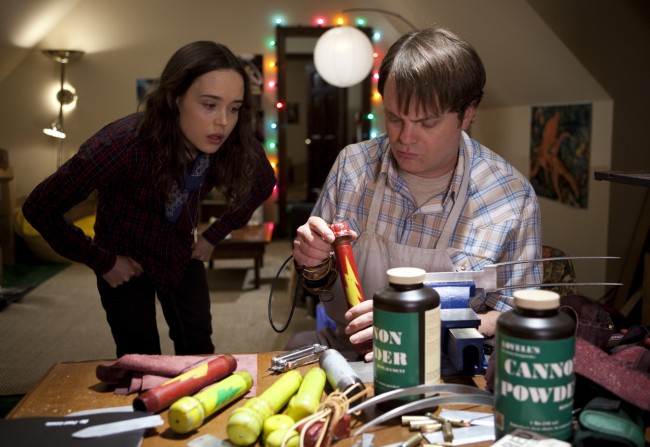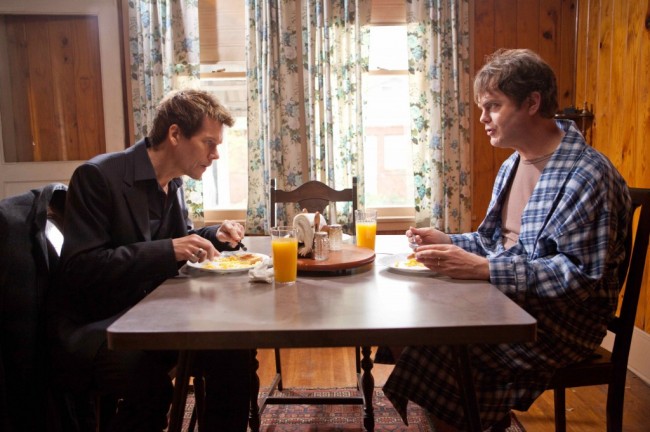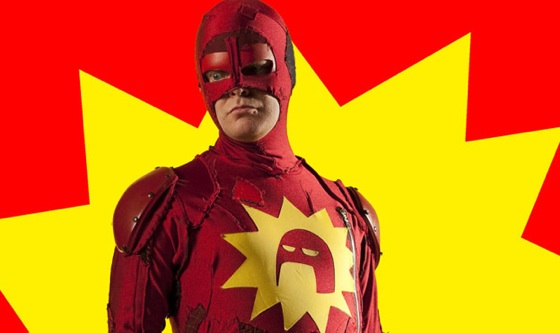
Sunday was a wonderful day. Why? Because I got to wake up in Austin, TX and go to South by Southwest Film Festival. And then there was the roundtable interview I got to partake in with James Gunn to promote his new movie Super, starring Rainn Wilson as a cook at a crappy diner who decides to take it to the crime in his city by way of a pipe wrench to the skull (read my review here).
Read the interview below:
TFS: There’s a lot of entries into that kind of self-reflective comic book scene now, things like Kick-Ass or Special. Were you aware and wary of this?
Gunn: I was aware of it because I wrote my script in 2002 so it was around before all those things. The first thing I heard about was Special, because Special was written after that and my movie was out there and we actually had financing by a different company at that time. I heard of Kick-Ass from Mark Millar, who’s an online friend of mine. We’ve been email buddies for a long time. He wrote me and was like “what’re you doing?” and I’m like “I’m getting this movie made called Super” back in 2004 and them I’m like “blah blah” I told him what it was and he was like “aw fuck, I’m writing a comic book that’s kind of like that”.
I was definitely wary of it, I was like “this sucks, Kick-Ass is being made into a movie, is that gonna mean we’re irrelevant?” but in the end the stories are so different. Our movie is about a guy who’s on his own sort of spiritual quest and he just happens to wear a superhero costume during it. But it’s really about the guy and not the costume.
Where did the concept come from? Are you a big comic book fan?
I’m a huge comic book fan. I’ve read comic books ever since I was a kid and I still read almost every comic book that comes out.
So that sort of engendered this idea?
Yeah, I’m enamored of superheroes, and I’m interested in how that interplays with our own lives. I think Super is a lot about pop culture and we view celebrities and superheroes as being part of this pop culture world we are not apart of, and this is about a guy that tries to enter that other world that’s so impossible and does so with some degree of success.

You said that you wrote the script in 2002, why did it take so long to go into production?
Well there’s a number of things. Number one, in 2004 I had Chuck Roven producing the script and it was a little esoteric; they wanted me to cut back on the violence and things like that. There with this company that was financing it and there was a list of people that could play the role that they would ‘okay’ and they would greenlight the movie. There were a lot of actors that wanted to play the role, but the only person I could see playing the role at that time was John C. Reilly, and he wasn’t a big enough star at the time to get the movie made. We were still gonna make the movie basically, but we hadn’t gotten to the point where we could cast the right actor. I needed somebody that could do the comedy, could do the drama, was big enough that he was physically threatening but goofy enough that he could be picked on by his fellow short-order cook at the diner and it was hard to find somebody like that.
At that time, I wrote the movie Slither which I was gonna sell and just make a few bucks so that I could go off and make this movie for no money. I turned in Slither on like a Thursday night, and on Friday morning Paul Brooks who ended up producing it called me and said “yeah I wanna greenlight the movie and I want you to direct it” and I was like “…okay”, so that’s what I did. That put a hold on things for awhile, and after Slither I wasn’t even sure I was going to direct another movie again, wasn’t sure if I wanted to, wasn’t sure if it was worth it to me, and started doing Web stuff because it was a lot more simple. It’s hard making a movie because it’s like…you lose your life. I mean really, I like being alive; I like having friends, going out, watching other people’s movies, and all these things I can’t do for a year while I make a movie. And then it comes out and it’s like “so what?”; as a kid growing up, I was like “I really wanna make movies and have everyone love me and go to film festivals and be interviewed by a bunch of people at a table” but none of it gives me any joy in real life, it just doesn’t. I like making the movies sometimes but it’s also hellish to make a movie so I’m a very confused individual.
It really wasn’t until my ex-wife Jenna Fischer called me up and said “why aren’t you making Super?” and I said “I don’t know, it’s a little esoteric, it’s weird, my manager doesn’t want me to make it, I’m not sure” and she said “have you ever thought of Rainn [Wilson] as Frank?” I had known Rainn for five years, we’d always gotten along well, and I was like “wow…that works.” From that moment forward, I felt the call to make the movie. I had my heart in it, and it made all the difference from other things I’ve done in the past. I feel really good about the movie, I would love other people to love but if they don’t, that’s okay too. It was a great experience, and having those other actors put themselves into it for literally no money; for them to do this for me and this project, it was a really great experience. And also people like Steve Gainer, the cinematographer, we had a real connection on set and he understood exactly what I wanted and we worked together perfectly, or Tyler Bates who did the score who’s a great partner. It was a really good experience.
What inspired the pipe wrench and the “Crimson Bolt” name?
Well, I don’t know where the Crimson Bolt came from; I think it was just the first name I thought of. I remember in the first draft I wrote, he went through different names of what he was going to call himself and somehow he arrived at the Crimson Bolt. Probably something that influenced me was coming up with a name that I didn’t think another superhero was named. Also, Frank’s not the most eloquent guy in the world so he’s not going to come up with the greatest name.
And the pipe wrench is simply something I would not want to be hit with.
Super is really dark and fucked up, but it’s also very optimistic. It feels like it actually does believe the possibility of changing the world on some level.
I think that one of the things that drives me in telling stories, and art in general, is finding the beautiful in a big mass of ugly. I guess I am an optimist in a pessimist brain, if that makes any sense. I believe in the innate goodness of most people in this world, and yet I’m a damaged soul like many other people and have my own demons and things I struggle with. I can’t be told life is beautiful through a normal positive thinking book or a Hallmark movie; that language doesn’t work for me. The language that works for me is the language of fucked up cinema, and comics and things like that. To find the beauty, I really need to go through a darker channel than most people.
This movie has some really frank violence in a sinister, dark world. Do you want the audience to laugh along?
Here’s thing about Super; that’s the fun of the movie. An easy one to explain is when he’s saying his prayer at the beginning of the movie. That may be my favorite scene of the movie. When he’s talking about his hair…it’s so so sad and so funny at the same time. [In the audience] there are always people laughing and other people getting mad at the people who are laughing and that’s what that scene is intended to be; it’s intended to be all those things mixed up together and you can laugh at it or you can feel sad. It’s all up to you.
Is there anything you wanted to get in that you had to scale back on, or did you just go all out?
All out. I mean I stupidly tricked the producers in the beginning by saying “people are gonna like this movie because it’s extreme or they’re not gonna like it, so if we start pulling back on things that are extreme and we’re gonna make it a nothing movie.” They went with that and I got to do whatever I wanted to basically.
But honestly I had this cast behind me who was all signed on because of the script, because of me, and we’re all doing this movie for nothing and we’re doing it because we want to make it the way we want to make it. To make a movie for a couple million dollars with that amount of talent attached is a rare thing.
Frank’s visions are really cool stylistically. What inspired them?
Gunn: I liked the mix of the spiritual and the visceral. In the script, it even says “Cronenberg-ian”. I really liked that mix; it’s something I’m interested in. There’s a book called “The Varieties of Religious Experience” written by William James in 1094 and it’s about people who have religious experiences, and a lot of religious leaders have had these spiritual awakenings and is it something that’s real or a problem with your brain? Whatever it is, I’ve had it, because I’ve had visions ever since I was a little kid. I think that’s a big part of what the movie’s about.
Anything on the horizon for you?
Well I have this movie called Movie 43 that we’re finishing up. It’s a Farrelly Brothers film where a bunch of comedy directors came in and directed different actors; everyone from Kate Winslet to Hugh Grant to Halle Barry. I have Elizabeth Banks and Josh Duhamel in my segment; it’s really extreme like Super but it’s full-out comedy. There’s no heart to it whatsoever. I got that, and then I’m trying to figure out what I wanna do next. I just finished this script and we’ll see what’s going to happen with that.

Any potential for a Dawn of the Dead sequel [the 2004 remake which Gunn wrote]?
No, not really. Years ago, Zack [Snyder, who directed] and I sat down and we talked about doing it and we actually came up with sort of a plot for it. It’s something we could do if we wanted to, but I’m not really feeling the zombies right now, there’s so many of them and I think it would have to be something very different. If I ever did another zombie movie, I don’t think it would be Dawn of the Dead 2.
Was it difficult to subvert everyone’s expectations about Rainn Wilson and Ellen Page, who have been sort of defined by their previous roles?
I was wary of it from the very beginning. Rainn said it at the very beginning “if I do something that is a ‘Dwight-ism’ just pull me aside and tell me’. The main thing for Rainn was to have a sense of vulnerability there; to really bring it out was the important thing with him. With Ellen, the reason she was attracted to the script was she said to me “for years, I’ve been asked to play characters who are wise beyond their years who one up the adults around her and this character is the exact opposite”. It’s a much different and immature character and Ellen brought this energy, this crazy madness, to the role and she’s normally low-key. I think for them as actors, it’s important for them to create characters that aren’t like the ones they are associated with.
Super is filled with both deadpan moments and very Troma-like moments. Were you nervous about combining the two? Was it always in the script?
That was always a part of it; to be able to have real people in these situations that were exploitative and real. I wanted to keep things real and grounded, and have that element there. In Troma movies, and Lloyd [Lloyd Kaufman, head of Troma Studios] would admit this, the acting was pretty atrocious. When I was doing Tromeo and Juliet, I was writing for bad actors. It’s something you have to deal with at the beginning. In Super, I didn’t want to deal with that. I wanted to have the performances really good.
You had said the shoot was grueling. Could you elaborate on that?
We shot for 24 days. Most movies you shoot between 10-20 set-ups a day; we were shooting between 45-50 camera set-ups every day. We had to create on-set what we called “the culture of speed.” We needed to have the speed for work us as opposed to against us. We wanted that sense of urgency to feed the film as opposed to detract from it. I had a very explicit, specific shot list for the entire movie. So we got everything I needed, but it was really through careful choreography between me and my Cinematographer Steve Gainer and the AD Sheri Davani to be able to try to make it happen and try to memorize what we needed to do every day before we went to the set.
Did your experience with Troma help you to be able to work quickly and effectively?
There’s no doubt. Troma taught me everything about that; it taught me to think as both a director and a producer. If I was just listening to the director side of my brain, I would lose shots because I would be so focused getting the one scene the way I wanted it to be. I have to really learn how long it takes for me to do something so that I can take less time on things are less important and more time on things that are more important. I needed to give the actors room to breathe and more time and the right amount of time to get all the shots I needed. If I just rely upon an AD or a line producer to schedule that time, it’s going to go all wrong. It really has to be me that does it, because only I know what the movie is.
Super hits theaters April 1, 2011.

